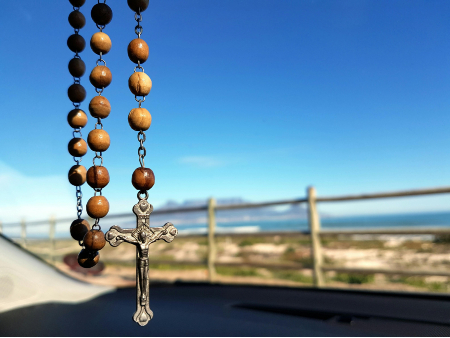We ask you, humbly: don't scroll away.
Hi readers, it seems you use Catholic Online a lot; that's great! It's a little awkward to ask, but we need your help. If you have already donated, we sincerely thank you. We're not salespeople, but we depend on donations averaging $14.76 and fewer than 1% of readers give. If you donate just $5.00, the price of your coffee, Catholic Online School could keep thriving. Thank you.Help Now >
MONDAY HOMILY: Invite the poor, the lame, the blind
FREE Catholic Classes
True greatness is found when we serve others without expecting repayment.
Highlights
Catholic Online (https://www.catholic.org)
11/5/2012 (1 decade ago)
Published in Year of Faith
Keywords: Homily, Daily Scripture Readings, Daily Mass Readings, Pharisee, Parables, Humility, Service, Poor, Needy, Charity, the Virtues, Ambition, St. Theresa, Sugar Land, Fr. Stephen B. Reynolds
style="margin: 0px; font: 14px Times New Roman; text-align: justify;">SUGAR LAND, TX (Catholic Online) From the moment that he was invited to the home of one of the Pharisees, Jesus was being watched (Luke 14:1). He was subject to a kind of religious surveillance, consistent with the skeptical attitude of much of the Jewish leadership towards Christ. The Lord was not deterred by the distrust of others, however, since the "Son of Man came to seek and to save the lost" (Luke 19:10).
Jesus does not waste any opportunity to proclaim the Good News. He teaches large crowds, family gatherings, and small assemblies in neighborhood synagogues. Jesus engages the good and the struggling, the proud and the curious. No one is beyond his saving mission: neither this Pharisee nor his guests; neither you nor me.
Why did this Pharisee offer Jesus a place at his table? Perhaps he was simply curious. Not necessarily the cynical curiosity of Herod Antipas (see Luke 23:8) and other enemies of the Lord, but possessing a sincere desire to experience firsthand the personality and preaching of Jesus.
The other guests provided the theme for Jesus' discourse. "He told a parable to those who were invited, when he marked how they chose the places of honor" (Luke 14:7). To assume honor for oneself can lead to disordered ambition, wherein a person seeks recognition for an excellence they do not possess (see St. Thomas Aquinas; S.T., IIa, IIae, q. 131).
What then, disposes a person to acquire the humility that is a characteristic of authentic excellence? "When you give a dinner or a banquet, do not invite your friends or your brothers or your kinsmen or rich neighbors, lest they also invite you in return, and you be repaid. But when you give a feast, invite the poor, the maimed, the lame, the blind, and you will be blessed, because they cannot repay you. You will be repaid at the resurrection of the just" (Luke 14:12-14).
Jesus exhorts us to examine our motives and intentions, and refine them through the practice of charity. Note that the Lord's words presume that we are already disposed to be altruistic and hospitable to others. A generous heart is indispensible for Christian discipleship.
Furthermore, authentic generosity is marked by self-forgetfulness. The follower of Christ does not practice charity in order to be noticed. Just the opposite ought to be true: "When you give alms, do not let your left hand know what your right hand is doing, so that your alms may be in secret; and your Father who sees in secret will reward you" (Matthew 6:3-4).
Because Jesus himself is the model for authentic charity, our practice of this virtue ought to reflect God's charity towards us. For this reason, the Lord commands us to serve those who are incapable of returning the favor. "Invite the poor, the maimed, the lame, the blind," Jesus says.
"The Lord asks us to love as he does, even our enemies, to make ourselves the neighbor of those farthest away, and to love children and the poor as Christ himself" (Catechism of the Catholic Church, no. 1825).
In addition to the poor and the sick, there are others: those with whom we disagree, those who have hurt our feelings, those who rub us the wrong way. Are we not called to serve them in some way? Perhaps not with a literal seat at our dinner table, but certainly with a measure of prayer and sacrifice.
Every celebration of the Holy Mass is a participation in, and anticipation of, the Paschal Banquet of Heaven, where the elect experience God face-to-face. In the Eucharistic sacrifice, Jesus invites us to share in His eternal wedding feast. May the merciful Lord grant us a spirit of selfless service, so that we might be made worthy to be called higher up.
Fr. Stephen B. Reynolds is pastor of St. Theresa Catholic Church in Sugar Land, Tx, a suburb of Houston. You may visit the parish website at: www.SugarLandCatholic.com.
---
'Help Give every Student and Teacher FREE resources for a world-class Moral Catholic Education'
Copyright 2021 - Distributed by Catholic Online









 Daily Readings for Tuesday, April 16, 2024
Daily Readings for Tuesday, April 16, 2024 St. Bernadette: Saint of the Day for Tuesday, April 16, 2024
St. Bernadette: Saint of the Day for Tuesday, April 16, 2024 Prayer for our Family #1: Prayer of the Day for Tuesday, April 16, 2024
Prayer for our Family #1: Prayer of the Day for Tuesday, April 16, 2024

